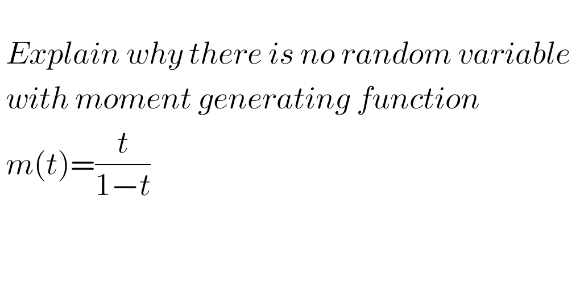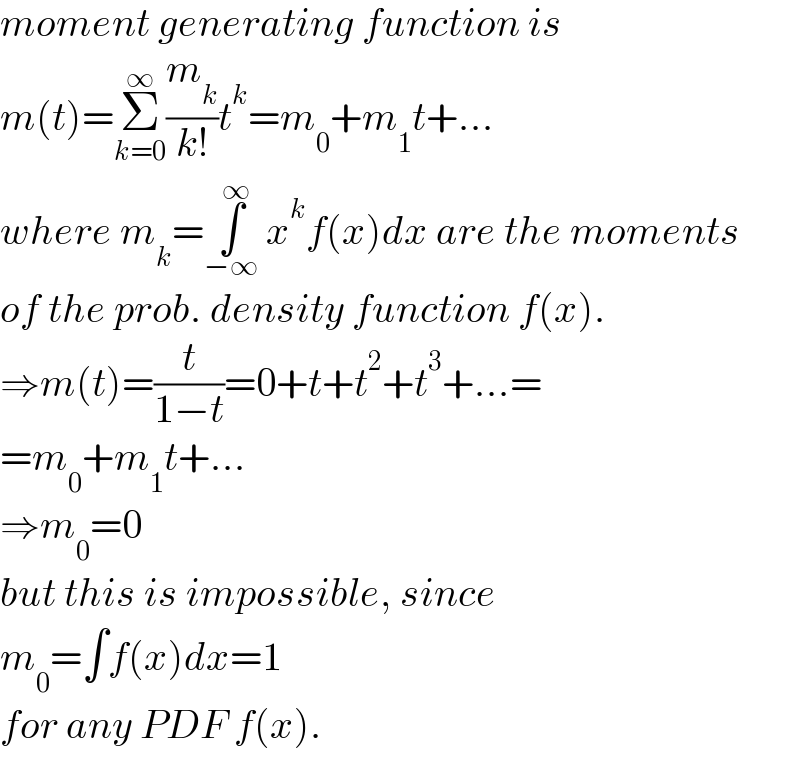
Question Number 209030 by Spillover last updated on 30/Jun/24

Answered by aleks041103 last updated on 30/Jun/24

$${moment}\:{generating}\:{function}\:{is} \\ $$$${m}\left({t}\right)=\underset{{k}=\mathrm{0}} {\overset{\infty} {\sum}}\frac{{m}_{{k}} }{{k}!}{t}^{{k}} ={m}_{\mathrm{0}} +{m}_{\mathrm{1}} {t}+... \\ $$$${where}\:{m}_{{k}} =\underset{−\infty} {\overset{\infty} {\int}}\:{x}^{{k}} {f}\left({x}\right){dx}\:{are}\:{the}\:{moments} \\ $$$${of}\:{the}\:{prob}.\:{density}\:{function}\:{f}\left({x}\right). \\ $$$$\Rightarrow{m}\left({t}\right)=\frac{{t}}{\mathrm{1}−{t}}=\mathrm{0}+{t}+{t}^{\mathrm{2}} +{t}^{\mathrm{3}} +...= \\ $$$$={m}_{\mathrm{0}} +{m}_{\mathrm{1}} {t}+... \\ $$$$\Rightarrow{m}_{\mathrm{0}} =\mathrm{0} \\ $$$${but}\:{this}\:{is}\:{impossible},\:{since} \\ $$$${m}_{\mathrm{0}} =\int{f}\left({x}\right){dx}=\mathrm{1} \\ $$$${for}\:{any}\:{PDF}\:{f}\left({x}\right). \\ $$
Answered by Spillover last updated on 04/Jul/24

$${since}\:\:{m}\left({t}\right)=\frac{{t}}{\mathrm{1}−{t}}\:\:{is}\:{not}\:{defined}\:{for}\:{the}\:{t}=\mathrm{1} \\ $$$${this}\:{implies}\:{that}\:{there}\:{is}\:{no}\:{probability}\:{distribution} \\ $$$${associated}\:{with}\:{this}\:{moment}\:{generating}\:{function} \\ $$
Commented by aleks041103 last updated on 04/Jul/24
![may be. by definition m(t)=E[e^(xt) ] m(0)=E[e^(x.0) ]=E[1]=1≠(0/(1−0))=0 but m(1)=E[e^x ] if this doesn′t exist then ∫_(−∞) ^(+∞) e^x f(x)dx doesn′t converge. This implies almost nothing or at least I don′t see how this proves that f doesn′t exist. For example f(x)=(1/2)e^(−x/2) H(x), where H(x)=1 for x≥0 and H(x)=0 for x<0. This is a pdf, since it is locally integrable and obv. ∫_(−∞) ^∞ f(x)dx=∫_0 ^∞ e^(−(x/2)) d(x/2)=1 but ∫_(−∞) ^∞ e^x f(x)dx=∫_0 ^∞ e^((x/2)) d(x/2), which diverges.](Q209233.png)
$${may}\:{be}. \\ $$$${by}\:{definition} \\ $$$${m}\left({t}\right)={E}\left[{e}^{{xt}} \right] \\ $$$${m}\left(\mathrm{0}\right)={E}\left[{e}^{{x}.\mathrm{0}} \right]={E}\left[\mathrm{1}\right]=\mathrm{1}\neq\frac{\mathrm{0}}{\mathrm{1}−\mathrm{0}}=\mathrm{0} \\ $$$${but} \\ $$$${m}\left(\mathrm{1}\right)={E}\left[{e}^{{x}} \right] \\ $$$${if}\:{this}\:{doesn}'{t}\:{exist}\:{then} \\ $$$$\int_{−\infty} ^{+\infty} {e}^{{x}} {f}\left({x}\right){dx}\:{doesn}'{t}\:{converge}. \\ $$$${This}\:{implies}\:{almost}\:{nothing}\:{or}\:{at}\:{least}\:{I} \\ $$$${don}'{t}\:{see}\:{how}\:{this}\:{proves}\:{that}\:{f}\:{doesn}'{t}\:{exist}. \\ $$$${For}\:{example}\:{f}\left({x}\right)=\frac{\mathrm{1}}{\mathrm{2}}{e}^{−{x}/\mathrm{2}} {H}\left({x}\right),\:{where}\: \\ $$$${H}\left({x}\right)=\mathrm{1}\:{for}\:{x}\geqslant\mathrm{0}\:{and}\:{H}\left({x}\right)=\mathrm{0}\:{for}\:{x}<\mathrm{0}. \\ $$$${This}\:{is}\:{a}\:{pdf},\:{since}\:{it}\:{is}\:{locally}\:{integrable} \\ $$$${and}\:{obv}.\:\int_{−\infty} ^{\infty} {f}\left({x}\right){dx}=\int_{\mathrm{0}} ^{\infty} {e}^{−\left({x}/\mathrm{2}\right)} {d}\left({x}/\mathrm{2}\right)=\mathrm{1} \\ $$$${but}\:\int_{−\infty} ^{\infty} {e}^{{x}} {f}\left({x}\right){dx}=\int_{\mathrm{0}} ^{\infty} {e}^{\left({x}/\mathrm{2}\right)} {d}\left({x}/\mathrm{2}\right),\:{which} \\ $$$${diverges}. \\ $$$$ \\ $$
Commented by Spillover last updated on 05/Jul/24

$${thank}\:{you}\:{for}\:{clarification} \\ $$
